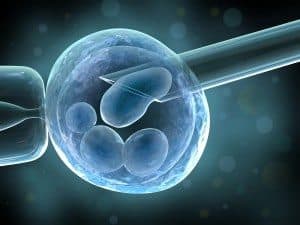
09 Jan 2013 Kansas Sperm Donor Trapped by DIY Insemination Loophole
The lawsuit by the state of Kansas against hapless sperm donor William Marotta of Topeka continues to make headlines. In case you unplugged during the holidays, here’s the back story: In 2009 Mr. Marotta responded to a Craig’s List ad soliciting a sperm donor to enable a lesbian couple, Angela Bauer and Jennifer Schreiner, to have a child together. All three parties signed a sperm donor agreement stating that Marotta would have no parental rights or responsibilities for the child. Marotta delivered sperm to the couple’s home, and the two women performed the insemination themselves. Schreiner became pregnant and gave birth to a daughter. Marotta says he was not paid for his donation.
In 2010, after eight years together, Bauer and Schreiner split up but continued to co-parent their eight children, including the daughter created using Marotta’s sperm. Schreiner subsequently contracted an illness that prevented her from working, so she enrolled her daughter to receive health insurance under the state’s Medicaid program.
That’s when things took a bad turn for Marotta. In order for the now 3-year-old child to qualify for benefits, the Kansas Department for Children and Families required that Schreiner disclose the name of the child’s biological father, the sperm donor. Under Kansas law, had the artificial insemination been performed by a licensed physician, the sperm donor would have been absolved of all parental responsibility. But because Bauer and Schreiner performed the insemination in the privacy of their own home, with no doctor involved, Kansas considers the sperm donor, Marotta, to be the legal father of the girl, and the state is pursuing him for $6,000 worth of back child support. Marotta, who told media he was unaware that the insemination would be performed without a doctor, has retained an attorney and is fighting the claim. An evidentiary hearing originally scheduled for January 8, 2013, has been rescheduled for April 9, according to the Topeka Capital Journal. Oral arguments in the case are scheduled to begin on June 17.
Angela de Rocha, spokeswoman for the DCF, told the Topeka Capital Journal on Monday that the department is only complying with state law. “Speaking generally, all individuals who apply for taxpayer-funded benefits through DCF are asked to cooperate with child support enforcement efforts,” de Rocha told the newspaper. “If a sperm donor makes his ‘contribution’ through a licensed physician and a child is conceived, the donor is held harmless under state statute. In cases where the parties do not go through a physician or a clinic, there remains the question of who actually is the father of a child or children. DCF is required by statute to establish paternity and then pursue child support from the noncustodial parent.”
While it seems ludicrous for the state of Kansas to go after Marotta, the basis for the law is the state’s interest in protecting babies. Thirty-five of 50 U.S. states have sperm donor statutes. In nearly every case, if the sperm donation is made through a licensed sperm bank or licensed clinic, the sperm donor is deemed not to be the father. However, most such laws do not absolve the sperm donor of parental obligation when the sperm donation is made outside the auspices of a licensed physician or clinic.
If states strictly interpret these statutes, and state financial aid is implicated in some way, the states will be looking to identify and pursue potential child support obligors and collect reimbursement for any aid that might be granted to the single parent. Most of these laws do not require the state to assess the INTENT of the donor and the recipients (in this case, the donor was never intended to be the father or treated as a father). If he qualifies as a parent/potential support obligor under state law, the state can go after him.
This is definitely an issue for the state legislatures to take up and, it is hoped, come up with laws that are more reflective of and up to date with current society and the vast array of possible ways in which families are formed through assisted reproduction.
This seems unlikely to happen quickly, so the need for and benefit of model legislation seems clear. There ARE two versions of the Uniform Parentage Act—one which was originally written in 1973 and later amended in 2000, and another version from 2002—and nine states have adopted versions of the UPA. The American Bar Association also has proposed a Model Act governing assisted reproduction. Such model legislation can be adopted by a state in whole or in part, to help it craft its own legislation. Given the complexity of this issue and many other ART issues, these model acts can serve a vital role. (Note: For more on the UPA and other issues surrounding LGBT parenting, my colleague, Courtney Joslin, has coauthored with Shannon P. Minter an excellent book, Lesbian, Gay, Bisexual and Transgender Family Law (West 2012). The book is available through Westlaw at http://store.westlaw.com/lesbian-gay-bisexual-transgender-family-law-2012/180460/40472179/productdetail.)
 DIY inseminations such as Bauer and Schreiner’s are not uncommon. Many couples turn to voluntary sperm donors, sometimes friends or relatives. The motivation is often financial: artificial inseminations performed by a doctor or licensed fertility clinic can cost $3,000 or more—per round. Because artificial insemination often is not successful the first time, multiple rounds of insemination are sometimes required before pregnancy is achieved, the bill mounting by the thousands for each successive round.
DIY inseminations such as Bauer and Schreiner’s are not uncommon. Many couples turn to voluntary sperm donors, sometimes friends or relatives. The motivation is often financial: artificial inseminations performed by a doctor or licensed fertility clinic can cost $3,000 or more—per round. Because artificial insemination often is not successful the first time, multiple rounds of insemination are sometimes required before pregnancy is achieved, the bill mounting by the thousands for each successive round.
However, there are dangers associated with non-medical inseminations—in addition to potential future paternity claims. With a licensed clinic, a sperm donor would be pre-screened for sexually transmitted diseases and genetic diseases. In fact, had Bauer, Schreiner and Marotta been living in Georgia when the insemination occurred, these three individuals would have committed a felony: Pursuant to Georgia statute, O.C.G.A. § 43-34-37 (a) Physicians and surgeons licensed to practice medicine in accordance with and under this article shall be the only persons authorized to administer or perform artificial insemination upon any female human being. Any other person or persons who shall attempt to administer or perform or who shall actually administer or perform artificial insemination upon any female human being shall be guilty of a felony and, upon conviction thereof, shall be punished by imprisonment in the penitentiary for not less than one year nor more than five years.
On one of the many news broadcasts about this case, the statement was made that this issue would never have arisen if the state of Kansas recognized same-sex relationships, because the names of both mothers would have been on the child’s birth certificate. (Kansas amended its constitution to ban same-sex marriages or civil unions in 2005.) Marotta’s attorney, Ben Swinnen, says he believes the state’s suit is politically motivated; the cost of litigation will far exceed the state’s $6,000 claim on Marotta, he says.
But it’s not same-sex marriage that is at issue in this case. In Kansas, there are only four ways to avoid a support obligation: (1) be a donor through a licensed clinic, (2) have parental rights terminated in court through a petition or if there is abuse or abandonment by that “parent,” (3) relinquish the child to an agency for adoption, or (4) the child is adopted by a parent. The applicable sperm donor statute in Kansas, 23-2208(f), pertains to any artificial insemination performed without the benefit of a licensed physician, regardless of whether the inseminated mother is part of a heterosexual couple, a same-sex couple or is single. So even if Bauer and Schreiner were a legally married same sex-couple, the state of Kansas could (and apparently does) still interpret the sperm donor statute strictly—and it is looking for “dad” for purposes of enforcing a child support obligation or looking for reimbursement of state aid.
The same result would occur in Minnesota. In that state, a man who is the genetic father of a child is subject to the establishment of his legal parentage (against his will) unless he is expressly statutorily exempted from such an action. A donor is only statutorily exempted from the presumption (and establishment) of legal parentage based on his genetics if he donates (1) to a married couple, (2) with the signed consent of the husband, (3) joined in by the wife, (4) under the supervision of a licensed physician (Minnesota Statutes Section 257.56). In Minnesota, if a sperm donor donated to a lesbian couple, the state can assert the sperm donor is a legal parent because he is genetically related to the child, donated to a lesbian couple, and the insemination was not done through a licensed physician.
What might have made a difference in Marotta’s case would be an update of Kansas’ parentage statutes to give legal recognition to a same-sex second parent.
The bottom line, and advice Mr. Marotta undoubtedly wishes he had received in 2009, is, if you are using genetics and trying to create babies, EVEN IF IT IS FOR A FAMILY MEMBER OR A FRIEND, talk to a lawyer first.

















